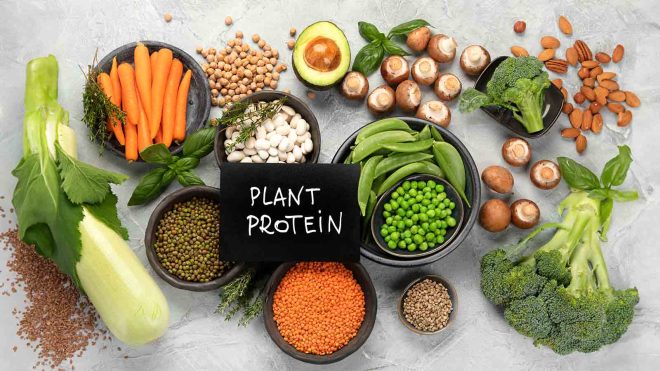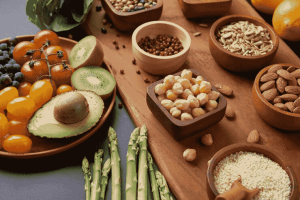
7 Benefits of Plant-Based Protein and How to Get Them
Benefits of high-protein plants. This helps improve your overall health and aids in muscle building and weight management.
Contrary to the belief that only non-vegetarian foods are rich in protein, there are many vegetarian foods that are rich in protein. Protein is an essential macronutrient needed for tissue building and repair, enzyme production, and immune system support. Important for muscle growth, strength, and overall health. Protein is made up of amino acids, and there are two main types of protein: animal and plant-based. Animal protein, found in meat, eggs, and dairy products, provides all the essential amino acids but is high in fat. Plant-based protein sources, such as legumes, nuts, seeds, and grains, are good for your heart. They are rich in fiber and antioxidants, which help balance your diet and reduce the risk of disease. Vegetarians who want to increase protein in their diet should know all this.
What is plant-based protein?
Protein is an essential component of amino acids. They are important for cell growth, healing, and all body functions, and are especially important for the growth and development of children, adolescents, and pregnant women. Protein is found in many foods and should be included in your daily diet.
Protein comes from plants and animals. Animal proteins include meat, fish, and eggs, while plant proteins are found in foods like beans, peas, soybeans, tempeh, gluten, nuts, seeds, some grains, and peas. Plant-based proteins are not only rich in protein, but also provide additional nutrients like fiber, vitamins, and minerals. While plant-based protein doesn’t contain all the essential amino acids in one place, combining different foods can help meet your body’s needs.

The Benefits of Plant-Based Protein
Plant proteins are found in foods like legumes, nuts, seeds, and grains, and they have a ton of benefits for your overall health. Learn 7 great reasons to add more plant-based protein to your diet:
1. Rich in antioxidants
Eating foods rich in antioxidants may help reduce inflammation and reduce the risk of chronic diseases like heart disease. According to a study published in the journal Antioxidants, many protein-rich plants, such as beans, lentils, and nuts, are rich in vitamins and phytochemicals like flavonoids and carotenoids, which generally enhance their antioxidant properties. They can help protect your body from damage caused by harmful free radicals.
2. Support the gut
Plant-based proteins are rich in fiber, which is good for digestion. “Foods like legumes and whole grains are rich in dietary fiber, which can help support regular digestion, support gut bacteria, and reduce the risk of digestive problems,” explains nutritionist and health coach Eshanka Wahi. A healthy gut supports nutrient absorption, immunity, and well-being.
3. Good for the heart
Plant-based foods contain more bad fats and cholesterol than animal products, making them ideal for heart health. Include foods like beans, nuts, and seeds, which are not only low in unhealthy fats but also contain beneficial nutrients like omega-3 fatty acids, potassium, and magnesium. According to Nutrients, the high protein content in these foods can lower blood pressure and reduce inflammation, thus reducing the risk of heart disease.
4. May Reduce Cancer Risk
According to research published in the journal BMC Women’s Health, a diet rich in protein, fiber, vitamins and other essential nutrients may protect you from certain types of cancer, especially breast cancer. For example, cruciferous vegetables such as broccoli and Brussels sprouts are rich in plant protein, which can reduce the risk of cancer. In addition, plant proteins do not contain harmful substances that are often found in some animal products and may help reduce the risk of cancer.
5. Helps manage weight
Plant-based protein can also help if you’re trying to lose weight. They’re more filling than animal proteins and can help you eat less and stay fuller for longer. The fiber in plant-based proteins can also help you feel fuller, reduce your risk of overeating, and help you lose weight.
6. Strengthen muscles
Both animal and plant proteins can help build muscle, but you need to exercise regularly. Include protein-rich foods like quinoa, apples, and hemp seeds to provide all the essential amino acids needed for muscle growth and repair. They also contain other important nutrients like fiber and low fat, making them healthy for you.
7. May Reduce Type 2 Diabetes
Eating a high-protein diet that includes legumes, nuts, and seeds is associated with better glycemic control and lower insulin resistance. It’s also generally low in unhealthy fats and sugars, which can help control blood sugar levels. Eating more may help reduce the risk of type 2 diabetes without causing weight gain, according to research published in the European Journal of Nutrition.
Plant protein sources
Here are some of the best plant proteins to add to your daily diet:
- Lentils
- Chickpeas
- Black beans
- Quinoa
- Tofu
- Tempeh
- Edamame
- Hemp seeds
- Chia seeds
- Almonds
- Peas
- Oats
- Sunflower
- Spirulina
Protein supplements
Protein-rich powders can be found in sources such as peas, hemp, rice and soybeans and are a good alternative to animal sources. These supplements are easier to digest than some animal proteins and can provide additional fiber and other important nutrients. While they can help you meet your protein needs, the American Dietetic Association recommends eating a variety of foods that can help you get all the essential nutrients and protein. If you choose to supplement with protein, it’s best to talk to your doctor to evaluate your specific needs and make the right choice.

How much protein do you need?
Everyone needs protein, but the amount you need will vary based on factors like age, weight, and lifestyle. For example, pregnant or breastfeeding women and athletes often need more protein. According to Harvard Health Publishing:
The general recommendation for protein intake is about 0.8 grams per kilogram of body weight, or 0.36 grams per pound. This is the minimum daily requirement to meet nutritional needs.
Pregnant or breastfeeding women should consume 75 to 100 grams of protein per day to support fetal growth.
People over the age of 50 who weigh more than 60 kg need 53 grams of protein per day.
Remember that more than the recommended daily protein intake is not considered safe. Consuming too much protein daily can put stress on the kidneys and liver and increase health risks such as osteoporosis and kidney stones.
Are there any side effects of plants high in protein?
Plant proteins are generally safe and have few side effects, but they can cause some problems. Here are some common side effects:
1. Digestive problems
Eating too much can cause digestive problems such as bloating, constipation, diarrhoea, and gas. Some plant proteins, such as peanuts, can also cause irritable bowel syndrome (IBS). This is because our bodies sometimes have trouble breaking down plant protein. If you are experiencing these issues, try limiting your daily plant protein intake.
2. Allergic reactions
Some people may have a sensitivity or intolerance to certain plant proteins, such as grape juice. If you think you have a sensitivity to plant protein, talk to your doctor for advice on the right protein powder to meet your daily needs.
3. Kidney function
The body processes protein for nutrients and removes waste products through the kidneys. Consuming too much plant protein can affect kidney function. However, some studies, including a 2012 study published in the American Journal of Kidney Diseases, suggest that the diet is beneficial for kidney health.
Who should not eat plant proteins?
Plants are rich in carbohydrates, so those on a low-carb diet may want to avoid them. Additionally, people with kidney problems should avoid plant-based protein because consuming too much protein will make things worse.
Is animal protein better than plant-based protein?
Animal proteins, such as meat, eggs, and dairy products, are rich in nutrients such as all the essential amino acids and vitamin B12, making them easy-to-digest complete proteins. But they also contain cholesterol and saturated fat, which can cause heart disease.
On the other hand, plant-based proteins from sources like legumes, grains, nuts, and seeds provide fiber, antioxidants, vitamins, and minerals. While they don’t provide a complete amino acid profile on their own, combining different foods can create more protein.
So while both are healthy, sometimes you should consume animal protein to reduce your risk of heart disease. By doing so, you can benefit from both protein sources and improve your overall health.
